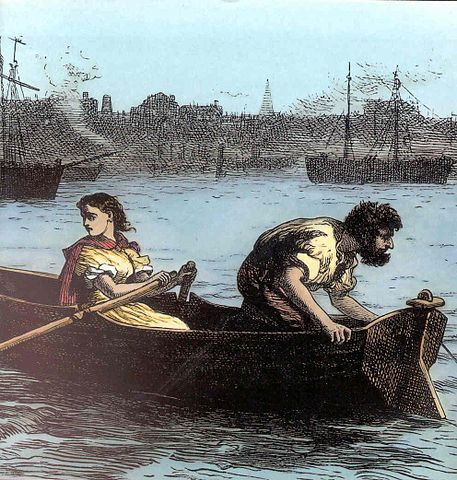[Editor’s note: This post by longtime Classical Pursuits leader Nancy Carr was originally published on the Great Books Foundation website. Thanks to Nancy and the GBF for letting us post it here.]

by Marcus Stone
Last month I spent fifteen hours, spread over five days, leading a group of thirteen people discussing a 151-year-old novel. And doing Dickens’ Our Mutual Friend for the Classical Pursuits program is number one on the list of fun, mind-expanding things I did this summer.
Each year, Toronto Pursuits offers me the chance to immerse myself in literature with curious, like-minded people for a week. It’s like a college remix that includes only the very best parts of the higher education experience—the seminars you loved, the friends you made, the relative leisure you enjoyed—and none of the downsides (courses you struggled in, post-adolescent drama, debt).
My group this year were an exemplary collection of literary investigators, willing to follow the twisting alleyways of Dickens’ last completed novel wherever they led. The sun was shining outside our room on the Victoria University campus, but we were rowing down the muddy nighttime Thames with Lizzie Hexam, exploring Mr. Venus’ dusty taxidermy shop, or being dazzled by the Veneerings’ heavily-laden dining room table.
The more time we spent with Our Mutual Friend, the more questions we had about it. Some of these seemed simple but proved challenging to resolve (What did Mr. and Mrs. Boffin know about John Harmon, and when?), while others were obviously complex (Is Dickens saying that character is inborn or created by social conditions?) Guided by the principles of Shared Inquiry™, we helped each other unravel the complicated plot and weigh answers to questions of meaning. Every member of the group contributed ideas, and every member listened. In a time when public affairs seem to be dominated by angry and intransigent grandstanding, it was a tonic to recall that civil discussion is possible.
My favorite moment came on the last day of discussion, when one of the group members said that while she still didn’t enjoy Dickens, she felt she had a much better understanding of what he was attempting to do and why. The other group members were surprised to hear this, since this member had offered multiple insightful ideas in discussion and had given no indication that she disliked the book. To me this member epitomized what discussion, and Shared Inquiry, is about.
If we practice open-ended questioning, use evidence to support what we say, and listen carefully to others, we open ourselves to understanding not only literature, but also the world, in a new way. If we are less interested in convincing others of our opinion than in hearing a range of ideas, we are on our way to becoming truly wise. My experience of discussion this July reminded me that each of us has the potential—and the responsibility—to become deeper thinkers and better listeners.
Nancy Carr is a senior editor at the Great Books Foundation. Nancy earned a Ph.D. in English from the University of Virginia and has led a number of discussions at Classical Pursuits. She would like to give particular thanks to Alice, Beatrice, Beth, Maria, Bonnie, Lizabeth, Lillian, Diana, Helen, Richard, Ann, Pat, and Carol for participating in Classical Pursuits’ “Our Mutual Friend” seminar this July.
